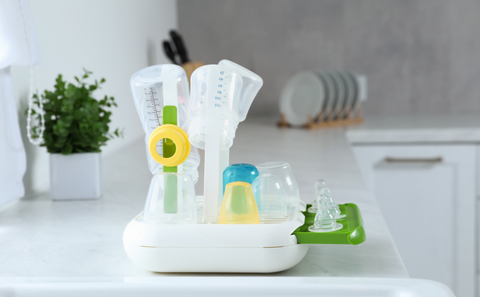Hi nimble cares friends! We've teamed up with Jess Thomas, founder of The Good Night Sleep Consultant, to help us understand the science and basics of baby sleep and how we can use it to our advantage and get our much-deserved unbroken sleep.
Why is My Baby Not Sleeping Well?
It’s the million-dollar question. If you’ve got a baby, the chances are you’ve googled it, asked a friend, or cried it into your pillow at night. Baby sleep feels like such an enigma. We assume babies are either ‘good sleepers’ or ‘bad sleepers’. So, whether we get any sleep in the first year (or five) of our little one’s life feels like the luck of the draw. My guess is, if you’re reading this, you probably think you didn’t get lucky in the baby sleep stakes. Perhaps this is your last-ditch attempt at sleep. Or maybe you’re scrolling at 3 am because, well…
But you don’t really believe things can – or will – ever change.
Good news: change is possible. Read on for three reasons why your baby may not be sleeping well – and what YOU can do to change that.
1. Environment’s not right
The sleep environment is absolutely key for enabling little ones to sleep well. The good news is it’s relatively easy (& won’t cost the earth!) to create the optimal environment.

2. Daytime sleep needs adjusting
Most families that I speak to assume that if they manage to keep their baby awake longer in the day or before bedtime, they will be more likely to sleep better at night out of sheer exhaustion. This is a myth! Although it is possible for little ones to be undertired at night because they’ve had too much daytime sleep, it is far more common for sleep to be disrupted due to overtiredness.
Let me explain with another hormone. This one is cortisol, and it is absolutely essential for enabling us to get out of bed in the morning! Like melatonin, our bodies naturally produce it at key points in a 24-hour period, most notably towards the end of the night as our bodies naturally prepare to wake up. It is therefore often known as ‘the wake-up hormone’.
So far, so good. Until our little ones get tired and don’t get the sleep that they need. At this point, their little bodies produce cortisol to give them a ‘second wind’. Suddenly, they seem happy when before they were a bit grumpy, wide awake when previously they looked sleepy. So, we keep them up a bit longer.
Cortisol then starts to build up in the body and takes a while to work through a child’s system. When they most need sleep therefore, the presence of cortisol makes it much harder for a little one to drop off, and can lead to bedtime battles, multiple night wakes and early starts. We then find little ones in a constant overtired cycle. So, what can you do about it?
A. Observe their wake windows.
Defined as the amount of time from when a little one wakes up until they next go to sleep, wake windows are critical in ensuring that infants are neither under tired nor overtired when their next nap or bedtime comes around. Going to sleep when sleep pressure is optimal will help to ensure that your little one drops off easily, as well as helping them to sleep good stretches at a time.
See the table below for my recommended wake windows by age:
|
Age |
Wake window after a long nap* |
Wake window after a short nap** |
|
0-8 weeks |
35-60 mins |
- |
|
2-3 months |
60 mins |
30-45 mins |
|
4-5 months |
60-90 mins |
45-60 mins |
|
6-8 months |
2 hours |
90 mins |
|
9-11 months |
3 hours |
2.5 hours |
|
12-18 months |
3.5-4 hours |
3-3.5 hours |
*a long nap is defined as anything lasting an hour or more.
**a nap which lasts under an hour counts as a short nap
B. Pay particular attention to the wake window before bed.
Wake windows should be roughly the same throughout the day, but the one before bed may be slightly shorter than earlier in the day. As sleep pressure builds throughout the day, most little ones will be pretty tired as bedtime comes around, and we want to avoid them going into bed overtired. If your wake window is going to be too long before bedtime therefore, don’t be afraid to introduce a power nap of around 30-45 minutes. This short nap will get your little one through to bedtime, whilst maintaining an optimal final wake window. Bedtime can also be brought earlier by up to an hour.
3. They’re reliant on something external to get them to sleep.
Once your little one hits four months, their sleep goes through a significant developmental change. Having previously slept in states of ‘active’ or ‘quiet’ sleep, your little one now sleeps in cycles of about 45 minutes. Each cycle begins with light sleep, before progressing into a deeper sleep and then finally coming into a light sleep again before the next cycle starts. In the same way that adults do, after a sleep cycle is completed, a little one will wake. As adults, we rarely remember this wake the next morning as it’s so brief. We simply roll over and go back to sleep. For little ones who need something external to get to sleep however, they will then struggle to go back to sleep by themselves.
Whether it’s rocking, shushing, breastfeeding or sucking on a dummy or bottle, if your little one falls asleep with an external aid, their sleep will most likely be disrupted. If you want to improve their sleep therefore, it may be time to gently wean them off that sleep aid and start to teach them to fall asleep independently.
So there you have it. Three reasons why your baby isn’t sleeping through the night. Chances are if you’re struggling with sleep, making changes in one or all of these areas will make a significant positive impact. And if you need more help? Follow along on Instagram @thegoodnightsleepconsultant for lots more sleep tips and advice or visit my website www.thegoodnight.co.uk to book a free discovery call today.










